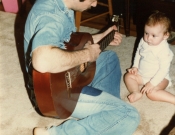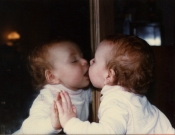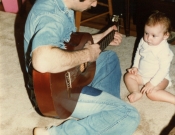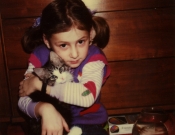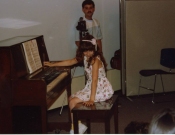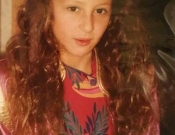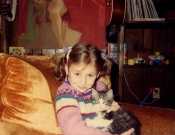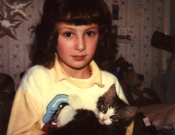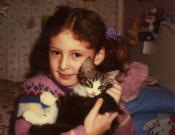Eros Incarnate
Music was Erica’s first language. Born to a famous rockstar father and an artistically gifted mother, she was surrounded by beauty from her time in the womb. At age four, she began piano lessons and wrote songs for her cat. By twelve, she had completed half a musical.
Gifted though Erica was, her passion was also a curse. Though she would not know it until decades later, her appearance was identical to classic depictions of the Greek God Eros, whose arrow poisoned people with romantic obsession. Likewise, Erica’s heart was on fire, and she couldn’t breathe without unleashing the flame into the arts. It could not be coincidence that she named her band ‘Erosian Exile’ and depicted herself in Erosia with white wings, only to later discover her likeness to the lovesick Eros.
Yet this burning romanticism made Erica feel alienated among civilized people. Their world was packed with laws and lies that felt too far from her inner animal. To this day, she insists, “I learned most of my behavior from my first cat.” She sang to her tape recorder in the woods and drew mobile homes in her diary, dreaming of an autonomous life with her keyboard in tow. She avoided television and video games and felt most alive in a world of honest emotion. Unfortunately, that world existed only in her mind.
At age eight, Erica found two characters who reflected her soul. Eponine, from Les Misérables, who was homeless and in love with a man who did not want her; and the Phantom of the Opera, who was ugly on the outside, but seduced a woman into his rich musical world. Both were outcasted romantics, carving their own paths with the flame of obsession – much like Erica. Such stories felt more real than her civilized cage, and inspired her to bring her visions to life through music and theater. If she could share her inner world, she would no longer be isolated, and might even find true love. She soon composed two 400-page novels and half a musical about a homeless prostitute on another planet. Despite her tender age, these works explored the themes of sexuality, survival, and sacrifice in harrowing depth. She felt catharsis as her suffering transformed into beauty.
At age 11, Erica had an epiphany that revealed to her complex music theory. Music is Divine Symmetry. By 13, she had a growing career, selling original songs to playwrites, gigging weekly in restaurants, and performing in theater. Yet she could not land lead roles. Directors told her: “You have the best voice we’ve ever auditioned, but you’re not pretty enough to be an ingenue.” But Erica pressed on. She practiced singing, piano, and acting, and even struggled through a dance class that left her in tears. Each year, she earned 100% scores on statewide vocal competitions, singing opera in foreign languages. At Berklee College of Music summer program, her test scores landed her a place in the highest music theory classes alongside aged professionals. After much toil, lead roles began to find her.
As her sixteenth birthday approached, she prepared to audition for Eponine on Broadway. Yet she was forced to miss the audition due to an unknown illness. Soon enough, she could no longer move or swallow, suffered 105 fevers, and found herself at the brink of death. After several misdiagnoses, it turned out she had Chronic Lyme Disease. Though she recovered her faculties, she would be dependent on medications indefinitely, and her voice was reduced to a whisper forever. Any hope of singing, or achieving autonomy, was gone. Her hard-earned beauty and deepest passion had been stolen. Though her body survived, her soul had died.











